|
|
|
Umelodica - a vocal ensemble created and conducted 1984-1989 by Örjan Larsson
Polly - a Ballad Opera
by John Gay from 1729 played by Umelodica and David Kettlewell in Febr. 1988.
|
The Swedish Program Folder for Umelodica's production by David Kettlewell.
|
English translation of the Program Folder.
|
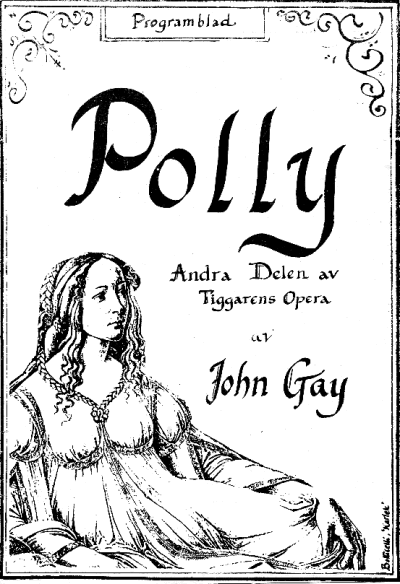 |
Program Folder
Polly
Second part of
The Beggar's Opera
by
John Gay
Butticelli "Love" |
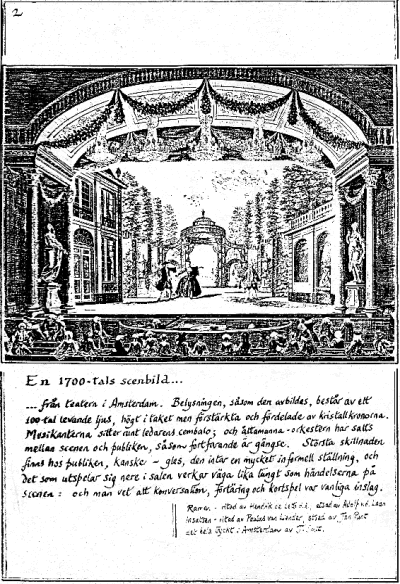 |
A stage scenery during the 18th century...
...from the stage in Amsterdam. The illumination, as seen from the picture, constitute 100 candles, high up towards the ceiling, but gained and distributed by the crystal chandeliers. The musicians sit around the master of the capella and his harpsichord; the 8 musician-orchestra are placed between the stage and the public, just as today. The main difference is the public, perhaps only a few, have a very relaxed attitude, and the activity among the public seems to be of simular interest as at the stage, i.e. it is known that conversation, food consumption and card games were common.
Picture printed in Amsterdam. |
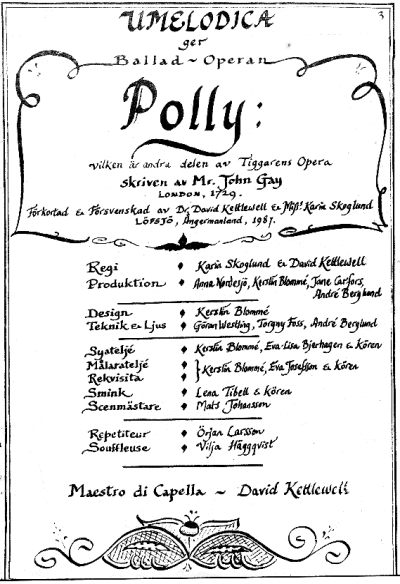 |
Umelodica
present
The Ballad - Opera
Polly:
being the second part of The Beggar's Opera
written by Mr. John Gay
LONDON, 1729
Shortened and translated to Swedish by Dr. Davis Kettlewell and Miss Karin Skoglund
LÖVSJÖ, Ångermanland, 1987.
| Regi | ~ Karin Skoglund and David Kettlewell |
| Production | ~ Anna Nordesjö, Kerstin Blommé, Jane Carfors, André Berglund |
| Design | ~ Karin Skoglund and David Kettlewell |
| Technicque and Light | ~ Göran Westling, Torgny Foss, André Berglund |
| Sawing studio | ~ Kerstin Blommé, Eva-Lisa Bjerhagen and the Chorus |
| Painting studio | ~ Kerstin Blommé, Eva Josefsson and the Chorus |
| Theatrical properties | ~ Kerstin Blommé, Eva Josefsson and the Chorus |
| Make-up | ~ Lena Tibell and the Chorus |
| Stage Master | ~ Mats Johansson |
| Repeater | ~ Örjan Larsson |
| Prompter | ~ Vilja Häggqvist |
| ------------------------------- |
Maestro di Capella - David Kettlewell
|
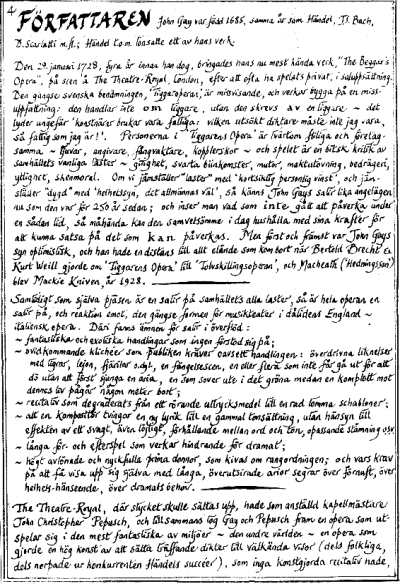 |
THE AUTHOR John Gay was born in 1685, the same year as J.S. Bach,
Domenico Scarlatti and G.F. Handel, and Handel actually composed music to one of Gay's texts.
On 29th January 1728, four years before he died, his most well-known work THE BEGGAR'S OPERA was staged at the Theatre-Royal, London,
having been previously performed in people’s houses. The common Swedish term, "The Begger Opera", is a misleading, and sems to depend on a misunderstanding: It is about
a beggar, but by a beggar - sounding like "artist use to be poor; what an exquisite poet I have to be, as poor as I am!" The persons in The Beggar's Opera are,
in contrast to Beggars, dilligent and creative - thives, informers, jailers, procuresses - the play is a sarcastic critisism of the common vices of the society - greed, black money, brides,
wielding of power, fraud, superficialness, hypocrisy. If we equate the out-dated concepts of "vice" and "virtue" with today's ideas of "short-term personal gain" and
"a whole view of what's best for everyone", then we can experience John Gay's satire as just as relevant as it was 250 years ago; and if we realize what not had been possible
to influence during such a period, the scrupulous may economize with his strength to be able to bet on what is possible to influence.
First of all, John Gay's view was optimistic, and he had distance to all misery, which was lost when Beetholt Brecht and Kurt Weil rearranged The Beggars Opera to the Threepenny Opera,
and Macheath (the son of the heathen) became Mackie the Knife in 1928.
At the same time as the play is a satire on Society’s vices, the whole work is a satire on the common form of musical theatre at that time - Italian opera.
There were plenty of objects for satire:
- fantastic and exotic stories which no-one could follow.
- irrelevant clichés which the audience demanded, whether they suited the story or not, such as tigers, a prison scene,
someone who has to sing an aria before he goes out to die, and so on.
- recitativo - "speaking in music" - which had degenerated from a moving form of expression to a series of empty clichés ...
- a composer forces a new lyric to an old composition, without consideration to the effect of a weak, often ridiculous, relation between poem an music, improper feelings ...
- lång pre- and post-ludes, which restrain the drama;
- expensive and temperamental prima donnas who bickered about their rank and position, and demanded absurdly long ornamental (coloratura) arias to show off their best notes,
never mind what the drama needs.
The Theatre Royal, where the drama should stage the play, had employed John Christoffer Pepusch as conductor, and togeter Gay and Pepusch created an opera, which takes place
in the most antastic environments - the underworld - an opera creating a geat art of giving apt poems to wellknown songs (partly popular, partly stolen from Händels succses's ),
which had no artificial recitative,
|
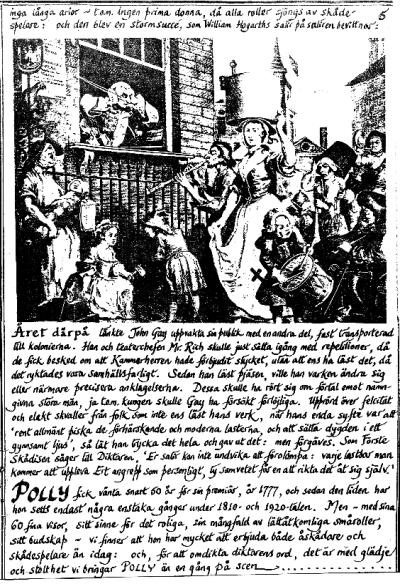 |
no long arean - even not a Prima Donna, as all parts was sang by the players: and it became a great success, as William Hogarths certyfies.
The following year, planned to follow up the public with a second part, but transported to the colonies (in the America).
He and the theatre's manager Mr. Rich, and the rehearsals were about to start, when news came that the Lord Chamberlain, the King's censor,
had forbidden the performance, without having read it, based only on rumours that the play was dgnger from the society. But after having read it, he refused to change his mind,
without qualify his impeachments. I was only sais to be attacks on named individuals, including the King, which Gay attempt to ridicule. Upset by the misquotation and slander
from people that had'nt even read his play, when his only aim was to "generally foment a mood against current and modern vices, and highlight the virtue",
he printed and published the play: without success. As the firsr player say to the poet, "your Satyr here and there is too free.
A man should be cautious how he mentions any vice whatsoever before good company, lest somebody present should apply it to himself."
Polly had to wait almost 50 years for its global première, 1777, and ever since has it been put to the stage once a while between 1810 and 1920.
But with it's nice 60 songs, it's sense of humour, it's multitude of easy small parts, it's message - we found that Polly yet has much to offer both public and actors:
and, to rewrite the words of the poets, "with pleasure and proudness, we bring Polly once again upon the stage"....
|
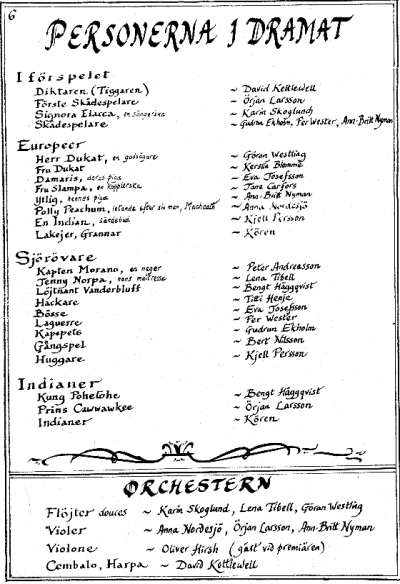 |
DRAMATIS PERSONAE
| Introduction |
| The Poet (the Beggar) | ~ David Kettlewell |
| First player | ~ Örjan Larsson |
| Signor Elacca, a singer | ~ Karin Skoglund |
| Players | ~ Gudrun Ekholm, Per Wester, Ann-Britt Nyman |
European |
| Mr. Ducat | ~ Göran Westling |
| Mrs. Ducat | ~ Kerstin Blommé |
| Damaris, their maid | ~ Eva Josefsson |
| Trapez, a procuresses | ~ Jane Carfors |
| Flimzy, her maid | ~ Ann-Britt Nyman |
Polly Peachum,
- searching her man, Macheath | ~ Anna Nordesjö
|
| An Indian | ~ Kjell Persson |
| Prompters, neighbours | ~ Chorus |
| Sjörövare |
| Captain Morano, a Negro | ~ Peter Andreasson |
| Jenny Norpa, his mistress | ~ Lena Tibell |
| Lieutenant Vanderbluff | ~ Bengt Häggqvist |
| Hacker | ~ Titti Tenje |
| Culverin | ~ Eva Josefsson |
| Laguerre | ~ Per Wester |
| Cutlace | ~ Gudrun Ekholm |
| Capstern | ~ Bert Nilsson |
| Cutlass (Hacker) | ~ Kjell Persson |
| Indians |
| King Pohetohe | ~ Bengt Häggqvist |
| Prince Cawwawkee | ~ Örjan Larsson |
| Indians | ~ Chorus |
|
| The Orchestra |
| Recorders | ~ Karin Skoglund, Lena Tibell, Göran Westling |
| Violins | ~ Anna Nordesjö, Örjan Larsson, Ann-Britt Nyman |
| Violone | ~ Oliver Hirch (guest at the premiera) |
| Harpsichord, Harp | ~ David Kettlewell |
|
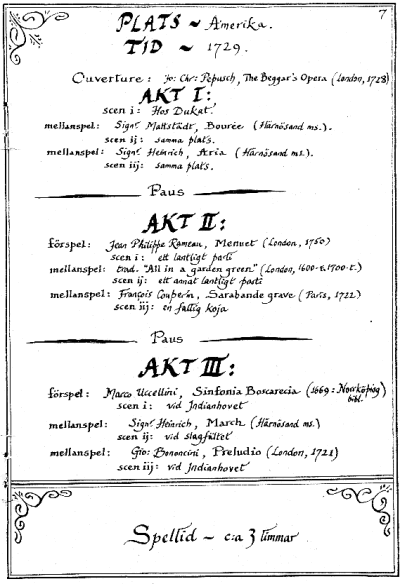 |
Place ~America
Time ~1729
Ouverture: J. Chr. Pepusch, The Beggars Opera (London, 1728)
ACT I
scen i: ~ Mr. Ducat's House
sinfonia: Sign. Mattstädt, Bourée (Härnösand)
scen ii: ~ the same place
sinfonia: Sign. Heinrich, Aria (Härnösand)
scen iii: ~ the same place
Pause
ACT II
sinfonia: Jean Philippe Rameau, Menuet (London 1750)
scen i: ~ in a country area
sinfonia: trad. "All in a garden green" (London 17th or 18th century)
scen ii: ~ in another country area
sinfonia: trad. Francois Couperin, Sarabande grave (Paris, 1722)
scen ii: ~ in a poor cottage
Pause
ACT III
sinfonia: Marco Uccelini, Sinfonia Boscaresia (1669
scen i: ~ in the Indian camp
sinfonia: trad. Signor Heinrich, March (Härnösand)
scen ii: ~ the Field of Battle
sinfonia: trad. Gio. Bononcini, Preludio (London, 1721)
scen ii: ~ in the Indian camp
Play-time ~ c:a 3 hours
|
 |
INDIANS and ~PIRATES?!...
Some of us have been so exposed in our younger years to a flood of clichés from the movies about redskins and palefaces,
that we might have problems erasing them when we first come across a different interpretation.
When you first read the play you might get the idea that John Gay simply used the Indians as a symbol for the uncivilied,
the non-European - he seems to be saying "Even savages have better morals than Europeans".
But a closer investigation shows that this is much more to it that this.
To take one well-reported case: during the 1710's the English concluded an alliance against other Europeans with Hiawatha's united tribes
- Indians who were settled farmers, with a highly developed culture.
When we then then start reading the Indians' own words preserved from the early history of colonialisation,
we discover that even in the more exotic elements of his satires John Gay stood on secure factual ground. |
"Who gave you all the countries that you now inhabit, by what Right do you
possess them? They always belonged to the Algonquins before."
Huron Chief Kondiaronk, a.k.a. Adario, c. 1690
|
"I know you as a man of injustice, who invades other people's property."
Cawwawkee, Act II, scene ii
|
| "The 'Europeans', who must be forc'd to do Good, and have no other Prompter for avoiding
of Evil than the fear of Punishment." the same
|
"These men have the greed of their country: their services are only due to the promise of gold."
Cawwawkee, Act III, scene i
|
| "What sort of Men must the 'Europeans' be? What Species of Creatures do they pertain to?"
the same
|
"You are human only in your outward appearance. Beasts would cast you out of the flock"
Pohetohe, Act III, scene iii
|
| " I fear no man ... I am Master of my Condition ... of my own body ... of my self ..."
the same
|
"[Your power?] I am not afraid of it ... I know that my virtue is in my own power."
Cawwawkee, Act II, scene ii
|
| "Thou deceivest thyselves greatly ... there is no Indian who does not consider himself infinitely more happy and more powerful than the
French." an unnamed Micmac chief, 1676
|
" How happy are these savages! Who would not wish to be in such ignorance."
Polly, Act II, scene ii
|
We also hear echoes of many of John Gay's formulations in the Indian speeches
of later date, whose content can also be survivors from earlier traditions:
|
| "Honour and honesty? - failings and follies. Actually I think honour is of some use - you can swear by it."
Morano, Act III, scene iii
|
"... we saw that the white man did not take his religion any more seriously than he did his laws,
and that he kept both of them just behind him to use when they might do him good in his dealings with strangers."
Crow chief Aleek-chea-ahoosh, c.1920
|
| "When rich we are honest, no doubt
Fine ladies can keep reputation
Poor lasses alone are found out." Morano, Act III, scene iii
|
"These poeple have invented many rules which the rich may break but not the poor"
Sioux Chief Sitting Bull, 1877
|
|
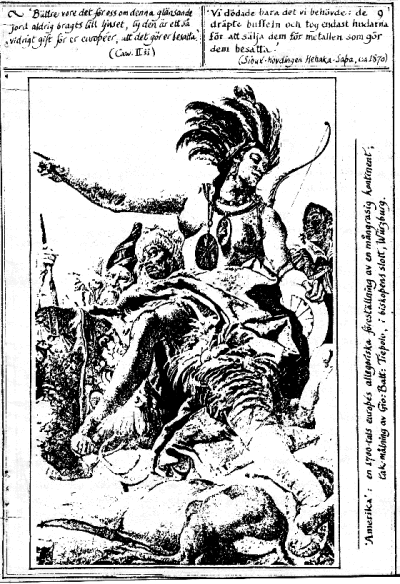 |
| "Ii would have been better for us if that shining earth had never been brought to the light...
to you Europeans, just to touch it makes you mad." Cawwawkee, Act II, scene ii
|
"We only killed what we needed: they wiped out the buffalo and took only the skins to sell them for the metal which makes
them mad." Sioux Chief Hehaka-Sapa, or Black Elk, c.1870
|
|
"America": an 18thcentury Europees allegorical imagination of a multi-rase continent;
Ceiling paintings by Gio. Balt. Tiepolo, in the cstle of the bishop, Würtzburg.
|
|
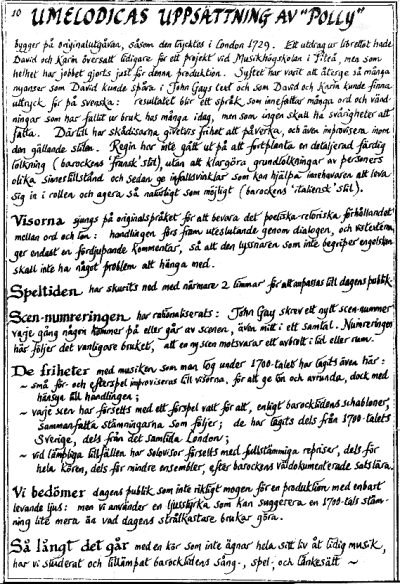 |
Umelodica's production of "Polly"
relies on the original version, as printed in London 1729. David and karin had previously translated a part of the libretto to Swedish
for a production at the Piteå Conservatory of Music, but as a whole, the entire play was translated for the Umelodica production. The aim of was to as many nuances as David could trave in John Gays text and to which David and Karin could find Swedish expressions: teh result became a language, which covers many words and expressions, which are out of use for many nowadays, but which none should have trouble to understand. In addition, the players have been given freedom to influence, and also to make improvisations within the valid manner. The direction has not been to reproduce a detailed interpret
( the French manner of the Baroque), but to explain foundations of the persons varying mental conditions and then give approach to help the actor to adapt the part and act as natural as possible (the Italian manner of the Baroque).
The ballads are perforrmed in the original English language to preserve the poetic/retoric relation between word and tone: the story is brought exclusively by the dialog, and the texts in the ballads makes only deeper comments. Thus, the audience without English experience will have no problem with the story.
The Play-Time has been cut with almost two hours to suit the public of today.
The Numbers of the Scenes has been rationalized: John Gay changed scene-number every time an actor appeared or disappeared - also within an ongoing conversation.
Current numbering follows follows the most common - with a change in time or place.
The Liberties concerning the music during the 18th century is adapted here.
- short pre- and post-playing are improvized to the ballads, to give pitch and to round off, though adapted to the story,
- each scene has got a prelude, in accordance with the baroque manner, to summarize the following mood - taken from 18th century in Sweden as from the contemporary London;
- at proper events, the solo-ballads have been added complete repeats, partly for the chorus, and partly for minor ensembles - according to the well-documented syntax of the baroque.
We judge that the audience of today are not completely ready for a production in candle lights: but we use a light intensity, which can influence by suggestion to
the feeling of 18th century - more than thwe soptlights of today use to do.
As far as posible for a choir which don't devote the life entirely to early music, we have studied and tries to applicate singen playeing and thinking in accordance with
the baroque epoch ~
|
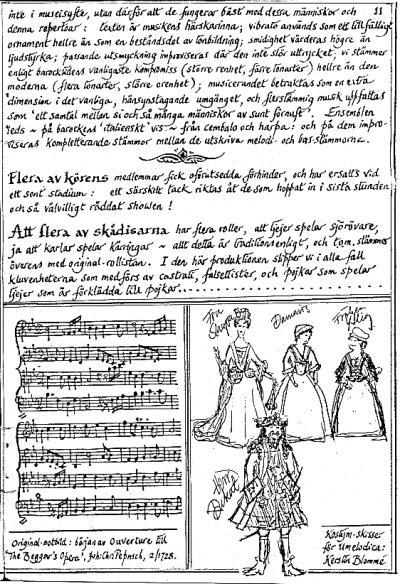 |
not with museum aims, but because it serve best with current play;
- the text is the master of the music;
- vibrato is used as a rare ornament rather than a part of vocalisation;
- smoothness is juge more than voice-strength;
- suitable ornamentationis improvised when not disturbing the expression;
- tuning is in accordance with the most common comprimize of the baroque (more pure pitch and fewer musical keys) rather than the modern (many keys, less pure pitch);
- making music is considered as an extra dimension in the common, considerate relations, and:
- multiple musical voices is conceived as "a dicussione betrween that many people of common sense"
- the emsemble is lead - in acordance with the baroque - from haprisichord and harp: on which
- improvisation voices are added to the printed melody and bass voices.
Several of the choir members were accidently prevented from playing, and were exchanged late; a particular thanks is directed to them who lately saved the show!
Several of the players had several characters, girls played pirates, men played old women ~ all in accordance with the original character-list.
However, current production is free from castrati!
Original Scores: Beginning of the Ouverture to
"The Beggar's Opera", Joh. Chr. Pepusch, 2/1725
|
Costume sketches for Umelodica:
Kerstin Blommé
|
|
|
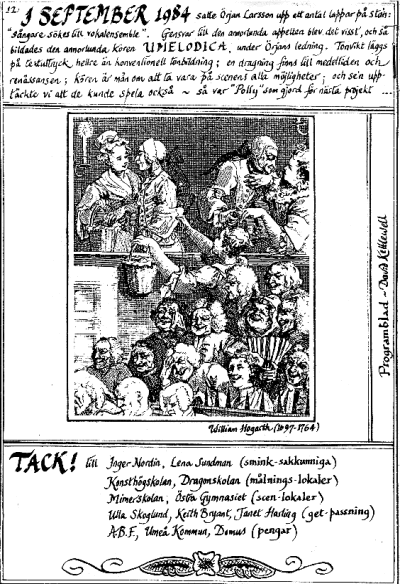 |
IN SEPTEMBER 1984 Örjan Larsson announced with small pieces of paper: "singers for a vocal ensemble is looked for".
In response to this unusual appeal the unconvetional chorus UMELODICA was created. Highlighted was rather the text expression than conventional vocalization;
a direction is current toward middle ages and renaissance; the chorus also care for the possibilities of the stage; and then we discovered that they also could act ~ then Polly suited as next project...
Thanks to
- Inger Nordin, Lena Sundman (make-up consultants)
- Academy of Fine Arts, Dragonskolan (decor-painting premises)
- Mimerskolan, Östra Gymnasiet (stage premises)
- Ulla Skoglund, Keith Bryant, Janet Hasting (goat-watches)
- A.B.F., Umeå Community, Domus (economic support)
Program Folder ~ David Kettlewell
|
|

